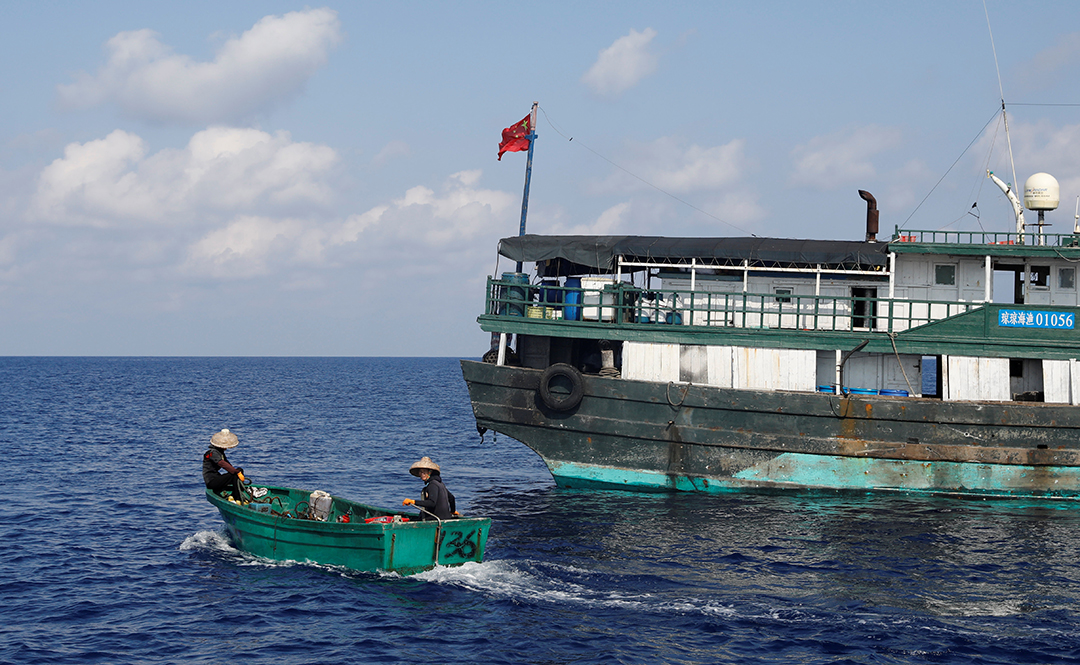China’s IUU fishing threatens more than livelihoods, economic stability

FORUM Staff
Fishermen from Africa to South America to Southeast Asia continue to condemn the People’s Republic of China’s (PRC’s) aggressive and coercive fishing practices.
“We will get less and less fish because we cannot control China’s overfishing. We may soon see the collapse of our fishing sector,” Jay Batongbacal, director of the University of the Philippines’ Institute for Maritime Affairs and Law of the Sea, told Deutsche Welle (DW), Germany’s international broadcaster, in late May 2021.
Philippine fishermen have been struggling from the invasion of Chinese fishing ships into their waters since 2012, when Beijing began erecting military structures on artificial islands in the South China Sea, fisherman Vicente Pauan told DW. The effects have been exacerbated in the past year by coronavirus-related lockdowns that are preventing operators from accessing larger markets, he said.
“We do not even have enough fish to feed our families. We sell at a loss and are buried in debt. We will starve,” Pauan, 35, said.
The PRC is the largest contributor to illegal, unregulated and unreported (IUU) fishing worldwide, according to the IUU Fishing Index, which ranks countries based on enforcement practices. IUU fishing accounts for nearly one-third of all ocean fishing, with 90% of global fish stock already fully exploited, overexploited or depleted, according to the United Nations.
The PRC also has the world’s largest distant-water fishing fleet, according to the IUU Fishing Index, with satellite data indicating about 17,000 such vessels registered in China. An additional 1,000 Chinese vessels are registered under flags of convenience, The Guardian newspaper reported. In comparison, the European Union and United States combined have just over 500 distant-water fishing vessels.
The PRC’s continued exploitation of fishing stocks poses a geopolitical threat to economic stability in the Indo-Pacific and beyond, experts contend. A collapse of worldwide fisheries would destroy the livelihoods of about 10% of the population and adversely affect about 3 billion people who rely on seafood as a primary source of protein, according to the U.N.
Batongbacal called the PRC’s expansion in the South China Sea inevitable.
“China has a population of over 1 billion that it needs to feed. There is nothing ideological or even political about that, it is simply practical,” he said.
The PRC’s IUU fishing activities are not only ecological and economic threats but also violate the rights of sovereign nations. In the South China Sea, Chinese fishing fleets have infringed on the exclusive economic zones of countries and contributed to the PRC’s takeover of contested territories through activities just short of overt military action. (Pictured: Chinese fishermen seek a catch in the South China Sea at the disputed Scarborough Shoal, which is claimed by the Philippines and the People’s Republic of China.)
“Beijing wants Chinese fishers to operate here because their presence helps to embody China’s maritime claims,” Ryan Martinson, an assistant professor at the China Maritime Studies Institute at the U.S. Naval War College, told The New York Times newspaper.
IUU fishing is also often connected to transnational organized crime, trafficking, forced labor, money laundering and tax evasion, according to the Global Initiative Against Transnational Organized Crime.
The U.S. and its allies and partners are working together to improve enforcement of IUU fishing and related crimes.
In late May 2021, U.S. Customs and Border Protection (CBP) banned seafood from a Chinese fishing fleet that investigators determined was using forced labor on 32 vessels, Reuters reported. CBP officials said that many Indonesian workers on Dalian Ocean Fishing vessels were subjected to physical violence, withholding of pay, debt bondage and abusive working and living conditions. Although the U.S. only imported about U.S. $233,000 worth of fish from Dalian in 2020, the ban is the first by CBP against an entire fleet, Reuters reported.
U.S. Department of Homeland Security Secretary Alejandro Mayorkas said the agency “will continue to aggressively investigate the use of forced labor by distant water fishing vessels, and by a wide range of other industries. Producers and U.S. importers alike should understand that there will be consequences for entities that attempt to exploit workers to sell goods in the United States.”
Forced labor is a growing source of tension between the U.S. and PRC after a series of import bans tied to the Chinese Communist Party’s detention of ethnic Uyghurs in China’s northwestern Xinjiang region.
IMAGE CREDIT: REUTERS




